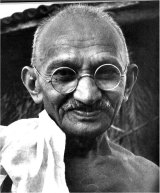Mark Zuckerberg’s sudden passion for the upliftment of the masses to the benefits of connectivity and access to the enlightening services of Facebook is not merely to ‘include’ everyone in the Internet. The undeniable fact is that he personally stands to benefit from the ‘inclusion’ of millions of young users who sign up for Facebook.
“With respect to the benefits which the British government actually confers on the people of India, and that those benefits have been uniformly progressive, there hardly appears to be an dissentient opinion. Let them consider whether the consecutive improvements which have taken place in the internal policy of that state, and which have succeeded each other with a rapidity scarcely precedented in the social history of mankind, could possibly have been brought to pass, if the grand operator of reform had been a living subject bound with a lifeless carcase…”1
– Right Hon. Charles Grant, President of the Board of Commissioners for the affairs of India, 1831
“This is why we created Internet.org, our effort to connect the whole world. By partnering with mobile operators and governments in different countries, Internet.org offers free access in local languages to basic internet services in areas like jobs, health, education and messaging. Internet.org lowers the cost of accessing the internet and raises the awareness of the internet’s value. It helps include everyone in the world’s opportunities.”
– Mark Zuckerberg, Chief Executive Officer, Facebook, 2015
Both the illustrious gentlemen whose quotes appear above have something in common. While they cry for the world’s poor and the downtrodden with philanthropic fervor, they shrewdly fail to mention a salient fact: that they personally stand to gain immensely from the monopoly which they attempt to foist under the garb of philanthrophy.
 During the early 1800s, the East India question was a much debated topic in Britain and the crux of the debate was whether to confer monopoly trading rights in India to the East India Company or, as some proponents of free trade argued, to allow other mercantile companies from Britain to trade with India. Charles Grant argued that considering the immense social benefits that British India enjoyed through the ‘grand operator of reform’ viz. the East India Company, and as an organ of the British government augmenting the British military with its own sepoys, the Company should be allowed to freely trade in India as a monopoly.
During the early 1800s, the East India question was a much debated topic in Britain and the crux of the debate was whether to confer monopoly trading rights in India to the East India Company or, as some proponents of free trade argued, to allow other mercantile companies from Britain to trade with India. Charles Grant argued that considering the immense social benefits that British India enjoyed through the ‘grand operator of reform’ viz. the East India Company, and as an organ of the British government augmenting the British military with its own sepoys, the Company should be allowed to freely trade in India as a monopoly.
The Right Hon. Charles Grant served as Chairman of the British East India Company (also as a member of the British parliament). His vigorous arguments in favor of restricting free trade to India and granting monopoly to the ships of the East India Company was not because of the benefits conferred on Indians as his speeches would indicate. The simple truth was that he stood to personally gain from the profits of the East India Company.
Mark Zuckerberg’s sudden passion for the upliftment of the masses to the benefits of connectivity and access to the enlightening services of Facebook is not merely to ‘include’ everyone in the Internet. The undeniable fact is that he personally stands to benefit from the ‘inclusion’ of millions of young users who sign up for Facebook. India is too huge and promising a market for Facebook to waffle about with notions like ‘net neutrality’ in 2015 (as ‘free trade’ was to the EIC in the 1800s).
Edmund Burke once lamented the excesses of young officers of the East India Company: “(East India Company officers) drink the intoxicating draught of authority and dominion before their heads are able to bear it, and as they are full grown in fortune long before they are ripe in principle, neither Nature nor reason have any opportunity to exert themselves for remedy of the excesses of their premature power.”2
Had Burke lived in 2015, there is little doubt whom he would have addressed these words to.
1 Source: “The Views and Opinions of Some Eminent and Enlightened Members of the Present Board of Control”, London: James Ridgway, Piccadilly, 1831
2 Source: “On Empire, Liberty, and Reform: Speeches and Letters of Edmund Burke”, ed. David Bromwich, New Haven: Yale University Press, 2000
Written by: Gokul

Well said and the quotes compared were apt to think for the similarities.. !
Zuckerberg and The East India company! I didn’t see that coming. It was a whole new take on net neutrality and a great one at that!